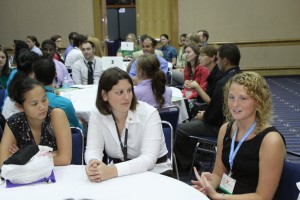
ASHP’s Student Leadership Development Workshops have benefited thousands of students since debuting in 2008.
WHEN ARPIT MEHTA, PHARM.D., attended ASHP’s Student Leadership Development Workshop (SLDW) at the 2010 Summer Meeting in Tampa, he couldn’t have known how much impact the three-hour program would have on his future.
“The workshop influenced me to choose a pharmacy administration track for my residency,” said Methta, who was a second-year pharmacy student at the time of the workshop. Now he’s finishing the second year of his pharmacy administration residency at West Penn Allegheny Health System in Pittsburgh.
“The workshop showed me that I would enjoy a leadership role, and it made me think about things that pharmacy students usually don’t consider.”
Developed through the work of the Section of Pharmacy Practice Managers’ Advisory Group on Leadership Development, the first SLDW was first held at the 2008 Pharmacy Society of Wisconsin’s annual meeting. It was part of ASHP’s response to warnings of an imminent leadership gap in hospital and health-system pharmacy—particularly a 2005 watershed paper by pharmacy leader and former ASHP President Sara White, M.S., FASHP[1].
Among White’s recommendations was the need to “identify and encourage students, residents, and practitioners who are interested in and have the ability to be leaders and change agents.”
Leadership Gap on the Horizon?
Diana L. Dabdub, director of ASHP’s Pharmacy Student Forum, concurred that the profession is facing a lack of new leaders and succession planning in coming years.
“Because many pharmacy leaders will be retiring, ASHP needed a way to interest more students in taking on both formal and informal leadership roles,” she noted, adding that when the workshop was first developed, few pharmacy school curricula include a focus on leadership development skills.
A major goal of the workshop is to spark student interest in leadership opportunities in pharmacy. Other objectives are learning to distinguish between leadership and management; understanding the relationship among administrative, clinical, and other general and specialty leadership roles; understand the need for strong leaders in the future; and learning how to build personal leadership qualities.
The first part of a typical SLDW covers leadership philosophies and concepts. During the second part, participants break into groups to explore contemporary leadership topics in depth and prepare and deliver a presentation to persuade the rest of the group (a role that is often played by C-suite level professionals in hospitals and health systems) to take a particular action, such as funding a new clinical pharmacy service.
The workshop leader—often a well-known figure in the profession—is assisted by several facilitators who are typically pharmacy residents or new practitioners. At least one of those facilitators has gone on to lead the workshops himself, according to Dabdub.
Since the SLDW debuted at the 2008 Pharmacy Society of Wisconsin’s annual meeting, it has been held at more than 20 other ASHP state affiliate meetings and several ASHP Summer meetings.
Not Just for Future Pharmacy Directors
According to David Chen, R.Ph., MBA, senior director of ASHP’s Section of Pharmacy Practice Managers, more than 2,000 pharmacy students have completed the workshop. Its popularity continues to rise.
“Leadership is an energizing topic that’s universal and timeless,” Chen said, adding that the workshop creates opportunities not only for the students to learn a great deal, but also to mingle with like-minded peers from other schools.
“The workshop is not just for people who want to become pharmacy directors or hold formal management positions, but for anyone who wants to understand and develop leadership skills, even if it’s in the context of clinical practice,” added Philip Brummond, Pharm.D., M.S., director of pharmacy at Froedtert & the Medical College of Wisconsin Froedtert Hospital in Milwaukee, who has led several workshops and was a member of original SPPM advisory group that developed the SLDW.
Students, he continued, come away with techniques they can use to “sell” themselves and their ideas, allowing them to accomplish what is needed for the patients they will serve over their career. “It teaches fundamentals in a fun, energetic, safe setting that promotes active participation and draws on real-world scenarios.”
Brummond recalls interviewing a pharmacist who was a workshop alumnus for a clinical pharmacist position when he managed pharmacy services at the University of Michigan Hospitals and Health Centers.
“During the interview, he talked about how much the workshop had meant in shaping his approach to practice,” said Brummond. “I hired him, and now he is an up and coming leader in his field.”
According to SLDW leader Meghan D. Swarthout, Pharm.D., MBA, BCPS, “the workshop brings to life challenges that students can expect to face in practice.” Swarthout, who is division director, ambulatory and care transitions, Department of Pharmacy, The Johns Hopkins Hospital, Baltimore, also believes the workshops are eye-opening for many students.
“It raises awareness that leadership isn’t directly tied to a title—that it happens at every level of a career and that it’s just as important for a frontline clinical pharmacist taking care of patients every day as it is for pharmacy directors and executive administrators,” she said.
Swarthout added that leaders and facilitators can gain as much as students do.
“Every time I conduct an SLDW, I’ve left more energized and full of new ideas. I’ve seen many students come up with ideas, and I said to myself, ‘I never thought of it that way, that could definitely apply to our health system.’ Because students see things in a fresh, different way, their questions and proposed solutions challenge me and help me develop my own leadership skills.”
Conducting Your Own SLDW
Because of the SLDW’s popularity, ASHP now has standardized workshop materials available on the ASHP website for members who are interested in putting on their own workshops. Resources include a slideshow, case studies, self-assessment questions, and a brief podcast with suggestions for how to conduct the program, make the best use of workshop resources, and promote the workshop to pharmacy schools and students.
“Everything has been vetted during many successful workshops, and now it’s pre-packaged and ready to use,” said Kate Farthing, Pharm.D., BCPS, FASHP, clinical coordinator with the Legacy Health System in Portland, Oregon, who led the SLDW in the spring of 2012.
“It’s plug-and-play, easy to personalize for your own purposes and for any given audience, and it instills the idea of becoming a leader,” she said, adding that the three-hour program can easily be shortened.
Additionally, the ASHP Foundation provides up to four grants annually to members who work with their ASHP state affiliated.
Molly Juhlin, Pharm.D., served as a facilitator at Farthing’s workshop when she was a third-year pharmacy student at Oregon State University. Juhlin, who is about to finish a residency at Legacy Health, said she benefitted as much as the students did.
“The workshop gives you an opportunity to learn from pioneers in the field who helped sculpt what pharmacy is now,” she said. “How can you pass up an opportunity like that? These people share a lot of advice on how to be successful practitioners and good leaders so that we can guide the field forward when the time comes.”
For more information on attending an ASHP SLDW, click here. If you are interested in conducting a workshop, click here.
–By Steve Frandzel
[1] Am J Health-System Pharm. 2005;62:845-855; http://www.ajhp.org/content/62/8/845.short?rss=1&ssource=mfc)



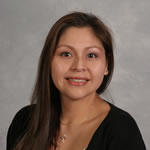
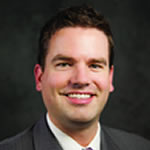
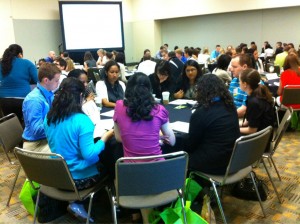

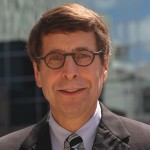
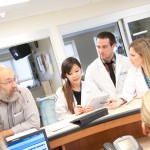

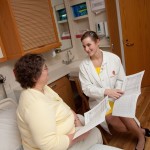

 If you want to contribute tutorials, news or other stuff please contact us. We pay 150 for each approved article.
If you want to contribute tutorials, news or other stuff please contact us. We pay 150 for each approved article. Consectetur adipisicing elit. Sed do eiusmod tempor incididunt ut labore.
Consectetur adipisicing elit. Sed do eiusmod tempor incididunt ut labore. This site uses valid HTML and CSS. All content Copyright © 2010 Newscast, Inc
This site uses valid HTML and CSS. All content Copyright © 2010 Newscast, Inc If you like what we do, please don't hestitate and subscribe to our
If you like what we do, please don't hestitate and subscribe to our